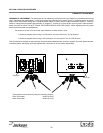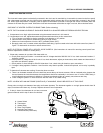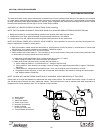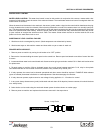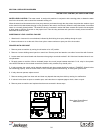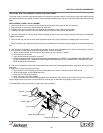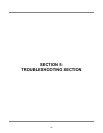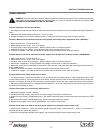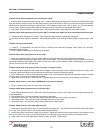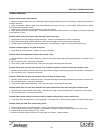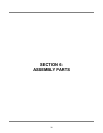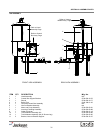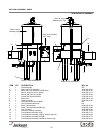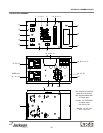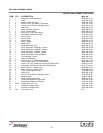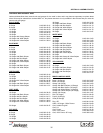
28
SECTION 5: TROUBLESHOOTING
COMMON PROBLEMS
Problem: Rinse water temperature too low (less than 180°F).
1. Incoming water temperature under required 140°F. Check incoming water temperature by first turning off heat switch, then
drain the machine wash tub. Next, with the master switch, push the fill switch up and hold 1 and a half minutes (90 seconds).
Release the fill switch and read the rinse thermometer. The temperature should read 140°F or higher. If it is not this tempera-
ture, then the customer’s supply water heater temperature must be adjusted to provide proper temperature.
2. Heat switch, relay thermostat or elements faulty. See instructions page concerning Rinse Tank heater system.
Problem: Rinse water temperature too hot (over 200°F) and water may dribble out of the rinse heads from time to time.
1. Thermostat needs adjustment or is faulty. See instructions page concerning thermostat adjustment.
2. Heat relay contacts welded or held shut. Remove power and alter cause, holding contacts closed or replace relay if need-
ed.
Problem: Vacuum breaker leaks.
1. Limed up. To disassemble: Use flat jaw wrench or channel locks. Remove the poppet. Clean poppet, top, and body.
Reassemble parts removed.
2. Faulty. Replace needed parts or whole vacuum breaker.
Problem: Wash arms spray water but do not rotate.
1. Wash cap adjusted too tight. See instructions page concerning removal of rinse and wash head assemblies.
2. Race ways where ball bearings rotate rough or full of food particles. See instructions page concerning removal of rinse and
wash head assemblies while apart. Clean race way with emery cloth or fine sandpaper. Soak ball bearings in lime dissolving
solution, rinse and dry with a lint free towel.
Problem: Wash water only spray up and out of tubes a couple of inches.
1. Overflow strainer clogged or pump intake strainer clogged. Remove overflow strainer. When the wash tub is empty, reach
in opening (where the overflow was) and remove the pump intake strainer and clean thoroughly.
2. Pump impeller worn or broken (only after many years of use). See instructions page concerning seal and ceramic on wash
and rinse pump for removal and inspection of impeller.
3. Obstruction in pump chute or wash manifold. Follow #2 above to remove pump then check chamber and manifold.
Problem: Wash motor or rinse motor (APRB Model only) does not operate.
1. Faulty. Checkout and remove for motor repair if necessary.
Problem: Wash water temperature too low (below 150°F).
1. Rinse water temperature too low. Raise rinse water temperature to a max of 196°F using instruction page concerning ther-
mostat adjustment.
2. Thermometer faulty. Check thermometer and replace if necessary.
3. Water level control faulty. See instruction page concerning water level control (wash heat circuit).
4. Wash heater faulty. See instruction page concerning wash tank heater system.
5. Thermostat faulty. See instruction page concerning wash tank heater system.
Problem: Water flow near rinse tank indicating leak.
1. Hood support pipe does not have two (2) O-rings below the support nut. The hood must be removed to check and replace
the o-rings, but be sure the leak is coming from there before proceeding.
2. Hood support block (center back of wash tub) is leaking. Tighten the screws from the inside of the tub. Sometimes you can
remove the screws one at a time and fill the holes with a non-hardening, food zone safe sealant and replace screws.
3. Hood support nut not down tight against washer, gasket, and table. Tighten down.



